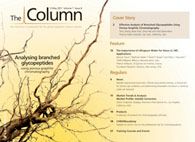Testing chromium in drinking water
Dionex has updated its methods to allow for more sensitive testing of toxic hexavalent chromium in drinking water.
Dionex has updated its methods to allow for more sensitive testing of toxic hexavalent chromium in drinking water. Concern about the dangers of hexavalent chromium in drinking water has been rising as the National Toxicology Program of the US Department of Health and Human Services has said that chromium-6 in drinking water shows evidence of carcinogenic activity. In addition, after the US EPA released a toxicological review of hexavalent chromium, the California Office of Environmental Health Hazard Assessment agency issued a new public health guideline setting the limit for chromate at 0.02 ppb in drinking water.
In response, Dionex has announced the release of Application Update 179: Sensitive Determination of Hexavalent Chromium in Drinking Water. According to the company this application update demonstrates a very sensitive ion chromatography method for determining hexavalent chromium at the proposed California level of 0.02 μg/L. Using the company’s 2 mm IonPac AG7 guard and AS7 analytical columns, the method appropriately reduces the flow-rates and reaction coil volume.
For more information visit www.dionex.com
This story originally appeared in The Column. Click here to view that issue.
New Study Reviews Chromatography Methods for Flavonoid Analysis
April 21st 2025Flavonoids are widely used metabolites that carry out various functions in different industries, such as food and cosmetics. Detecting, separating, and quantifying them in fruit species can be a complicated process.
Quantifying Terpenes in Hydrodistilled Cannabis sativa Essential Oil with GC-MS
April 21st 2025A recent study conducted at the University of Georgia, (Athens, Georgia) presented a validated method for quantifying 18 terpenes in Cannabis sativa essential oil, extracted via hydrodistillation. The method, utilizing gas chromatography–mass spectrometry (GC–MS) with selected ion monitoring (SIM), includes using internal standards (n-tridecane and octadecane) for accurate analysis, with key validation parameters—such as specificity, accuracy, precision, and detection limits—thoroughly assessed. LCGC International spoke to Noelle Joy of the University of Georgia, corresponding author of this paper discussing the method, about its creation and benefits it offers the analytical community.












